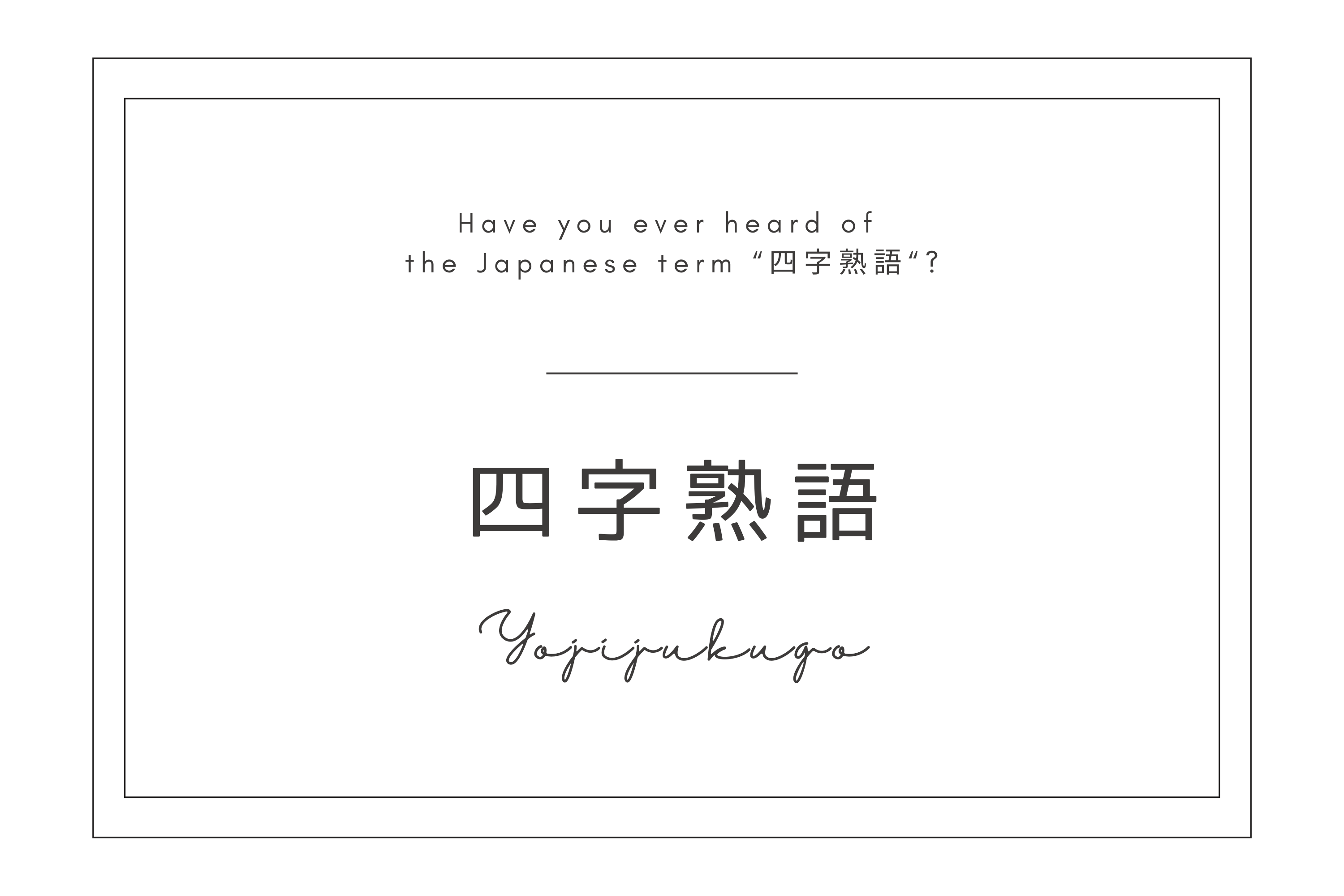
Introduction
In this article, I would like to introduce you to "Yojijukugo (四字熟語 )," which are Japanese idioms consisting of four kanji characters. You may think that four-character idioms are difficult or even intimidating because of the rows of kanji characters, but the following six idioms are written using only simple kanji. All of the kanji used in these idioms are typically introduced by 4th grade in Japanese elementary schools; on the JLPT, they are introduced at around level N5 to N3. Although there is a special way to read the kanji in these idioms, I am sure there are kanji that you are already familiar with, so I encourage you to read them while guessing their meanings.
① 一日千秋
(ichi-jitsu sen-shū)
② 十人十色
(jūnin to-iro)
③ 一心同体
(isshin dōtai)
④ 日進月歩
(nissin geppo)
⑤ 不言実行
(fugen jikko), 有言実行
(yūgen jikko)
⑥ 一期一会
(ichi-go ichi-e)
① 一日千秋 (ichi-jitsu sen-shū)
"一日 (first day of the month/one day)" is usually read as "ichi-nichi" or "tsui-tachi," but in this idiom, it is read as "ichi-jitsu." It means that a single day feels like a thousand years (i.e., a thousand autumns). When do you feel a day is longer than usual? Perhaps when you have planned a date night with your significant other, you might feel that you "can’t wait to see them," or you "wish that time would go by faster." As a child, you might have also looked forward to Christmas Day, and count down the days to the big event. When there are people you look forward to seeing, or an event you are looking forward to, a day can seem longer than it actually is. This idiom is used to express that feeling of longing for someone/something that makes the day feel longer. For example, you can use it as: "一日千秋 の思 いで恋人 を待 った (Waiting for my sweetheart for a day felt as if I were waiting for a thousand autumns)."
② 十人十色 (jūnin to-iro)
"十色 " is read as "to-iro." It means that if there are ten people, there are also ten different ways of conceiving the world, indicating that opinions, preferences, and personalities differ from one person to another. It is not about who is better or what idea is correct, but rather, it is about how we are all different and that is what makes each of us special. It is a perfect idiom for today’s world that values and embraces diversity, isn't it?
③ 一心同体 (isshin dōtai)
It is written as "one mind and one body." It means that two or more people are tightly bond together as if their minds and bodies belong to one person. When a group of people work on something towards the same goal, they can say, "一心同体 となって頑張 りましょう(let’s work together as one!)."
④ 日進月歩 (nissin geppo)
"日 " and "月 " means "day by day," and "進歩 " means progression. In other words, it represents constant and rapid progress. An examples of rapid progress would be in areas such as science and technology. This term is often used when talking about such topics. For instance, you could say "現代 の医療 技術 は日進月歩 だ (modern day medical technology is advancing rapidly)."
⑤ 不言実行 (fugen jikko), 有言実行 (yūgen jikko)
"不 " can be used to make a sentence negative, meaning "not~." "不言 " means "to not say (something)." "実行 " means "to do something." In other words, this idiom represents doing what needs to be done in silent, without complaining or reasoning. Sometimes there are people who speak big but do not take any action. Such people often lose trust from those around them. It might be easy to state something verbally, but difficult to actually take action. On the other hand, people who do not speak much and instead take action are called "不言実行 ." Isn't that admirable?
There is also another idiom "有言実行 " which is derived from "不言実行 ." It means that you always follow through on what you have said. This is also admirable, isn’t it?
Those who are "有言実行 " put pressure on themselves by declaring their goals to those around them, which might also help lead to receiving advice and cooperation from others. On the other hand, those who are "不言実行 " do not have to worry about the evaluations and criticisms from others, but will need to deliver results on their own. Are you a "不言実行 " type or an "有言実行 " type?
⑥ 一期一会 (ichi-go ichi-e)
"一期" is read as "ichigo," but I do not mean that sweet and delicious fruit; strawberry. "Ichi-go" means "a lifetime," and "ichi-e" means "a single opportunity/encounter/chance." In other words, it means "a once in a lifetime opportunity." When you think that you have just one opportunity, chance, or encounter in your lifetime, you would want to make the most of that one time, right? If we are able to keep this in mind, I believe we can live each day to the fullest. I would like to cherish each and every encounter, wouldn't you?
So far, I have introduced six Yojijukugo to you. Were you able to find your favorite idiom? The idioms listed above are commonly used as mottos as well. People often write these idioms as their New Year’s resolutions during "Kakizome (書 き初 め; first calligraphy written at the beginning of the year)." I would feel rejoiced if you were able to find a Yojijukugo that resonates with you!
